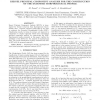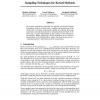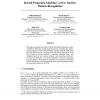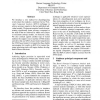247
click to vote
JMLR
2010
14 years 8 months ago
2010
This study explores the feasibility of estimating the Body Condition Score (BCS) of cows from digital images by employing statistical shape analysis and regression machines. The s...
120
click to vote
IGARSS
2009
14 years 11 months ago
2009
Kernel Principal Component Analysis (KPCA) is investigated for feature extraction from hyperspectral remotesensing data. Features extracted using KPCA are used to construct the Ex...
137
click to vote
PAMI
2010
15 years 14 days ago
2010
—A new formulation for multiway spectral clustering is proposed. This method corresponds to a weighted kernel principal component analysis (PCA) approach based on primal-dual lea...
130
click to vote
IJON
2007
15 years 1 months ago
2007
We present in this paper a novel approach for shape description based on kernel principal component analysis (KPCA). The strength of this method resides in the similarity (rotatio...
126
click to vote
NIPS
2003
15 years 3 months ago
2003
We consider the problem of reconstructing patterns from a feature map. Learning algorithms using kernels to operate in a reproducing kernel Hilbert space (RKHS) express their solu...
NIPS
2001
15 years 3 months ago
2001
We propose randomized techniques for speeding up Kernel Principal Component Analysis on three levels: sampling and quantization of the Gram matrix in training, randomized rounding...
136
click to vote
NIPS
2004
15 years 3 months ago
2004
This paper investigates the effect of Kernel Principal Component Analysis (KPCA) within the classification framework, essentially the regularization properties of this dimensional...
133
click to vote
ESANN
2003
15 years 3 months ago
2003
Abstract. We focus on covariance criteria for finding a suitable subspace for regression in a reproducing kernel Hilbert space: kernel principal component analysis, kernel partial...
124
click to vote
ACL
2004
15 years 3 months ago
2004
We introduce a new method for disambiguating word senses that exploits a nonlinear Kernel Principal Component Analysis (KPCA) technique to achieve accuracy superior to the best pu...
119
Voted
NIPS
2008
15 years 3 months ago
2008
Kernel Principal Component Analysis (KPCA) is a popular generalization of linear PCA that allows non-linear feature extraction. In KPCA, data in the input space is mapped to highe...




